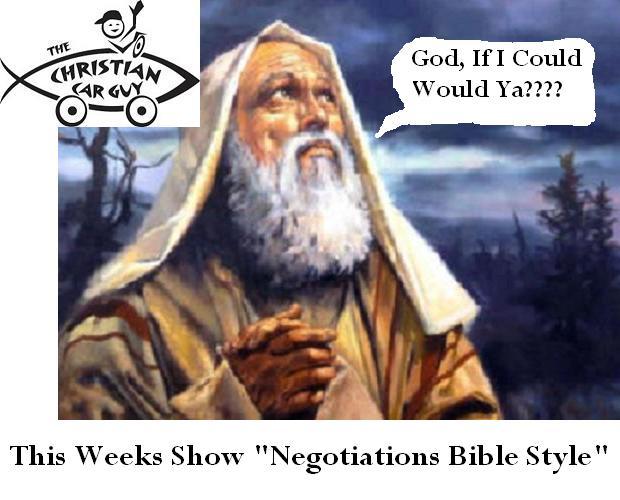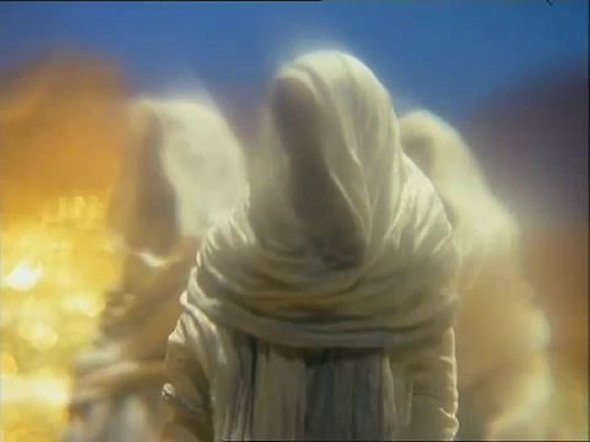 Having spent nearly 40 years directly involved in vehicle negotiations I always admired folks who were willing to risk open negotiations in high integrity, those who worked hard for maximum gain for both parties. This skill in my view is an art form that I believe God grants us the dignity of employing with Him. God provided us with these examples in the Bible that we may also enter into negotiations in our adventures with Him.
Having spent nearly 40 years directly involved in vehicle negotiations I always admired folks who were willing to risk open negotiations in high integrity, those who worked hard for maximum gain for both parties. This skill in my view is an art form that I believe God grants us the dignity of employing with Him. God provided us with these examples in the Bible that we may also enter into negotiations in our adventures with Him.
Below are several Biblical examples of negotiations with God. In order to delineate the points I think we can glean from the conversations I have added my negotiation commentary inserted into the text in RED. In all these cases the Biblical Characters invoked a “Collaborative Style” of negotiation as does God, meaning that both are going at this with the clear intention of both parties receiving maximum gain/ WIN WIN.
 Genesis 18:23-33
Genesis 18:23-33
New King James Version (NKJV)
23 And Abraham came near and said, “Would You also destroy the righteous with the wicked?24 (Abraham is trying to find a common interest) Suppose there were fifty righteous within the city; would You (This, “would you” is a common negotiation style to determine the bargaining range and God’s “reservation point”, in other words the point at which God will not back down) also destroy the place and not spare it for the fifty righteous that were in it? 25 Far be it from You (This “Far Be it from You”; is stating the integrity of the other bargaining Party, in this case God) to do such a thing as this, to slay the righteous with the wicked, so that the righteous should be as the wicked; far be it from You! Shall not the Judge of all the earth do right?”
26 So the Lord said, “If (God’s “IF” here provides the other Party, “Abraham”, with the bargaining range and opens negotiations) I find in Sodom fifty righteous within the city, then I will spare all the place for their sakes.”
27 Then Abraham answered and said, “Indeed now, I who am but dust and ashes have taken it upon myself to speak to the Lord:(Abraham here takes a position of humility to ask permission to continue negotiations and attempt to lower the bargaining range, note how slight the gradient that he uses, (Only coming down “five”) in order to not upset the process) 28 Suppose there were five less than the fifty righteous; would You destroy all of the city for lack of five?”
So He said, “If(Again God’s “IF” here provides the other Party, “Abraham”, with a lower bargaining range and continues open negotiations) I find there forty-five, I will not destroy it.”
The “If Then” Strategy is an almost fool proof way to determine a bargaining range. “If I paid $15,000 then would you sell it to me?” from the buyer perspective or “If I could sell it for $18,000 then would you buy it?” from the sellers perspective. You see by saying “IF” you are not committing only determining range.
29 And he spoke to Him yet again and said, “Suppose there should be forty found there?”(The bargaining now continues in open negotiation with a very slight gradient from an extremely humble Abraham until he is assured he knows God’s lowest reservation point, which turns out to be “10”. Although we all wonder why Abraham stopped at 10 when Lot’s family wasn’t but 6 max, perhaps Abraham sensed God’s frustration with the negotiations, a big part of the process is sensing the other party’s breaking point)
So He said, “I will not do it for the sake of forty.”
30 Then he said, “Let not the Lord be angry, and I will speak: Suppose thirty should be found there?”
So He said, “I will not do it if I find thirty there.”
31 And he said, “Indeed now, I have taken it upon myself to speak to the Lord: Suppose twenty should be found there?”
So He said, “I will not destroy it for the sake of twenty.”
32 Then he said, “Let not the Lord be angry, and I will speak but once more: Suppose ten should be found there?”
And He said, “I will not destroy it for the sake of ten.” 33 So the Lord went His way as soon as He had finished speaking with Abraham; and Abraham returned to his place.
Our next example is when Moses negotiated the lives of his people with God with my inserted commentary in red again.
 Exodus 32:9-14
Exodus 32:9-14
New King James Version (NKJV)
9 And the Lord said to Moses, “I have seen this people, and indeed it is a stiff-necked people! 10 Now therefore, let Me alone, that My wrath may burn hot against them and I may consume them. And I will make of you a great nation.”
11 Then Moses pleaded with the Lord his God, and said: “Lord, why does Your wrath burn hot against Your people whom You have brought out of the land of Egypt with great power and with a mighty hand? 12 Why should the Egyptians speak, and say, ‘He brought them out to harm them, to kill them in the mountains, and to consume them from the face of the earth’? (This time Moses is trying to find a common interest, the classic third alternative that has yet to be discovered by either party) Turn from Your fierce wrath, and relent from this harm to Your people. 13 Remember Abraham, Isaac, and Israel, Your servants, to whom You swore by Your own self, and said to them, ‘I will multiply your descendants as the stars of heaven; and all this land that I have spoken of I give to your descendants, and they shall inherit it forever.’] (Moses is stating the integrity of the other bargaining Party, and using an assumptive strategy while reminding God of previous parameters of the relationship.)14 So the Lord relented from the harm which He said He would do to His people.
Our next example: Gideon negotiates with God to determine God’s commitment. In my world Gideon wanted a non-refundable deposit.
Judges 6:36-40
New King James Version (NKJV)
 The Sign of the Fleece
The Sign of the Fleece
36 So Gideon said to God, “If You will save Israel by my hand as You have said— 37 look, I shall put a fleece of wool on the threshing floor; if there is dew on the fleece only, and it is dry on all the ground, then I shall know that You will save Israel by my hand, as You have said.”(By now I am hoping you see the “If Then” strategy that Gideon employed to determine God’s commitment) 38 And it was so. When he rose early the next morning and squeezed the fleece together, he wrung the dew out of the fleece, a bowlful of water. 39 Then Gideon said to God, “Do not be angry with me, but let me speak just once more: Let me test, I pray, just once more with the fleece;(Once again we see a humble request to reopen negotiations, this time Gideon limits this to “Just One More” probably sounds familiar if you have kids,(born negotiators of bed time, “just one more minute”)) let it now be dry only on the fleece, but on all the ground let there be dew.” 40 And God did so that night. It was dry on the fleece only, but there was dew on all the ground.
Our next example: Sampson negotiates with God for one last reflection of God’s power
Judges 16:28-31
New King James Version (NKJV)
28 Then Samson called to the Lord, saying, “O Lord God, remember me, I pray! Strengthen me, I pray, just this once, O God, that I may with one blow take vengeance on the Philistines for my two eyes!” (Here Sampson similar to Moses uses an assumptive strategy while reminding God of previous parameters of the relationship as well, but Sampson limits himself to just once like Gideon in order to gain permission.) 29 And Samson took hold of the two middle pillars which supported the temple, and he braced himself against them, one on his right and the other on his left. 30 Then Samson said, “Let me die with the Philistines!” And he pushed with all his might, and the temple fell on the lords and all the people who were in it. So the dead that he killed at his death were more than he had killed in his life.
As God has provided this glimpse into Biblical negotiations I do hope you will seek to use this information to enter into high integrity win/win negotiations both in determining how to walk with God but also with His image bearers.



